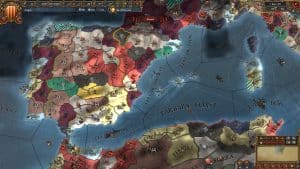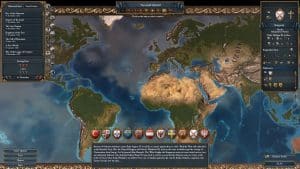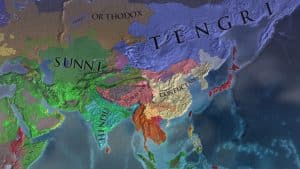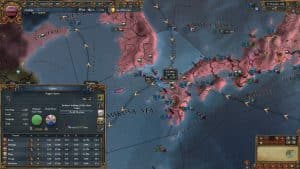Europa Universalis IV
Related Games
Description
🔥 What is Europa Universalis IV for PC
Europa Universalis IV is a grand strategy game developed by Paradox Development Studio and published by Paradox Interactive, known for creating some of the deepest and most replayable historical simulations in gaming. Released originally in 2013 but continually updated with expansions and patches, the game invites players to guide a nation from the late Middle Ages into the early modern era, spanning from 1444 to 1821. The player takes on the role of a monarch or governing power, managing everything from diplomacy and trade to warfare and exploration.
At its heart, Europa Universalis IV is a complex sandbox of history where every choice, treaty, and battle can reshape the world. Players can pick any nation on Earth and try to dominate their region or the entire globe through military conquest, colonization, alliances, or sheer economic power. Whether you lead France to continental supremacy, forge a naval empire with Portugal, or unite Japan under a single banner, the game offers nearly infinite outcomes and challenges that reward strategic depth and long-term planning.
The brilliance of the game lies in its dynamic world simulation: nations rise and fall, cultures spread, religions clash, and new technologies transform the balance of power. Europa Universalis IV remains one of the most respected strategy games ever made, offering a blend of historical authenticity and player freedom unmatched in its genre.
👉 Features of Europa Universalis IV
Deep Political and Diplomatic Systems
Diplomacy in Europa Universalis IV is a finely tuned web of alliances, royal marriages, rivalries, and betrayals. Every decision you make on the diplomatic stage can strengthen your nation or spell disaster decades later. The game’s AI nations have their own agendas and respond intelligently to your actions, meaning peace deals, coalitions, and alliances constantly shift in a living political ecosystem. Successful players learn to manipulate trust, power projection, and influence to secure their goals without always resorting to war.
Global Trade and Economic Power
The game features a sophisticated trade system that simulates the global flow of wealth through historical trade routes. You can control key ports, protect convoys with fleets, and steer trade toward your capital to dominate the economy. As you expand your empire, colonial nations and merchants create vast networks of income that sustain your military ambitions. The trade mechanics not only provide economic depth but also reinforce historical realism, showing how global commerce shaped empires across centuries.
Religion, Culture, and Reformation
Religious conflicts and cultural divisions play a major role in the game’s progression. The Protestant Reformation, for example, can tear Europe apart, forcing players to choose sides between faith and political opportunity. Managing religious unity within your borders becomes vital, as heresy and rebellion can destabilize even the strongest empires. Culture, too, shapes national identity and expansion, rewarding those who adapt and integrate diverse populations while punishing those who try to force assimilation.
Colonization and Exploration
Players can send explorers across uncharted seas to discover the New World, establish colonies, and build overseas empires. Exploration is not just a side activity it’s a strategic investment that determines access to resources, trade goods, and global influence. Competing powers may race to settle the same regions, and managing colonial subjects adds another layer of diplomacy and control. Each discovery reshapes your map and opens new opportunities for expansion or conflict.
Dynamic Warfare and Strategy
Wars in Europa Universalis IV require more than just raw numbers. Terrain, technology, leadership, and morale all factor into the outcome of battles. You must plan campaigns carefully, supply armies across continents, and decide when to engage or retreat. Naval supremacy, fort defense, and siege mechanics make warfare as much about patience and logistics as about brute force. The game’s war system rewards intelligent planning, making every victory satisfying and every defeat a hard-earned lesson.
Technology and National Ideas
Progress through time is marked by the adoption of new technologies and the unlocking of national ideas. Each nation has unique bonuses that shape its identity and strategic options. Players must balance investment between administrative, diplomatic, and military technologies, as well as embrace or reject new institutions like the Renaissance or Industrial Revolution. These systems ensure that every nation, from mighty empires to small duchies, feels distinct and evolves dynamically over centuries.
Gameplay
Strategy and National Management
At its core, Europa Universalis IV challenges players to balance countless interconnected systems economy, military, diplomacy, and internal stability. Each decision has far-reaching consequences, and short-term gains can lead to long-term problems if managed poorly. You will manage monarch points, stability, and overextension while keeping a watchful eye on your neighbors who might exploit any weakness. The thrill of the game comes from seeing your nation grow from humble beginnings into a world power through careful planning and bold risk-taking.
War, Peace, and Expansion
The wars in Europa Universalis IV are rarely isolated conflicts they often spiral into continental or even global struggles. Choosing when to strike and when to negotiate is essential. Warscore, occupation mechanics, and alliances shape the flow of each campaign. In peacetime, rebuilding your economy, stabilizing conquered territories, and planning diplomatic maneuvers create an equally rich strategic rhythm. Players who rush expansion often face rebellions, economic collapse, or devastating coalitions of enemies.
Events and Dynamic History
One of the most fascinating elements of the game is its dynamic event system, where historical and random events alter the course of play. You might face a dynastic crisis, a peasant uprising, or an unexpected opportunity to form a new nation. These events are often accompanied by meaningful choices that affect your economy, stability, or relationships. While history provides the framework, your actions create alternate timelines where new powers rise and empires fall in unpredictable ways.
Graphics
Map and Interface Design
Europa Universalis IV uses a stylized but detailed world map that visually evolves as your empire expands. Borders shift dynamically, provinces change ownership, and terrain types affect strategy in subtle ways. The map’s colors, textures, and lighting create a pleasing balance between clarity and atmosphere. The user interface, though dense, is designed to convey vast amounts of information efficiently once mastered.
Artistic Presentation and Clarity
The visual presentation prioritizes information over spectacle, which perfectly suits the game’s analytical nature. Small animations, advisor portraits, and national symbols bring personality to what could otherwise be an overwhelming spreadsheet of data. Over the years, numerous graphical updates and mods have improved map textures, lighting, and unit models, keeping the game visually engaging even by modern standards.
Audio and Immersion
The orchestral soundtrack, composed by Andreas Waldetoft, captures the sweeping scale of empire-building with majestic themes for peace and war alike. Each nation’s music subtly shifts based on culture and region, deepening immersion. Sound effects for battles, sieges, and exploration enhance the sense of progress and tension throughout the campaign.
Pros and Cons
✔️ Pros
- Exceptionally deep and flexible grand strategy experience that rewards long-term planning.
- Historically grounded simulation that allows creative and alternate history outcomes.
- Rich diplomatic, economic, and military systems that interconnect seamlessly.
- Endless replay value with thousands of potential nations and playstyles.
- Constant updates and expansions that refine gameplay and add new content.
❌ Cons
- Steep learning curve that can intimidate new players.
- Interface can feel overwhelming due to the game’s sheer complexity.
- Some systems rely heavily on DLCs for full depth and balance.
- Late-game performance can slow as empires and armies grow massive.
ℹ️ Game information
Release Date: 13/08/2013
Update Date: 04/11/2025
Version: v1.37.5
Genre: Simulation / Strategy
Platform: PC
Language: ![]()
![]()
![]()
![]()
![]()
![]()
![]()
![]()
Weight: 6 GB
Additional info: New version includes all DLCs to date
⭐ Installation Instructions
- The game is fully complete, you just need to install it, so there is no need to unpack it or download it from other sources.
- Just run the Europa Universalis IV.exe installation file.
- Simply launch the game from shortcut desktop.
⚙️ System Requirements
✅ Minimum:
- OS: Windows 10 (64bit)
- Processor: Intel® Core™ i3-2105 / AMD® FX 4300
- Memory: 4 GB RAM
- Graphics: Nvidia® GeForce™ GTX 460 / AMD® Radeon™ HD 5850
- DirectX: Version 9.0c
- Network: Broadband Internet connection
- Storage: 6 GB available space
✅ Recommended:
- OS: Windows 10 (64bit)
- Processor: Intel® Core™ i3 3240 / AMD® FX 8120
- Memory: 8 GB RAM
- Graphics: Nvidia® GeForce™ GTX 560 Ti
- DirectX: Version 9.0c
- Network: Broadband Internet connection
- Storage: 6 GB available space
Images








